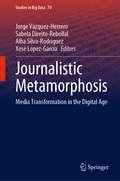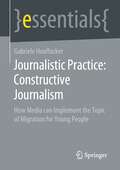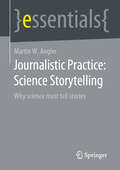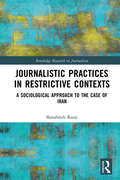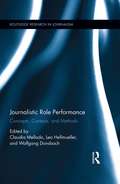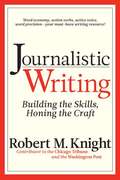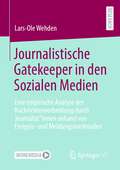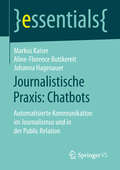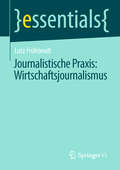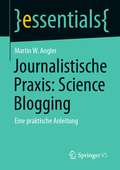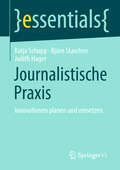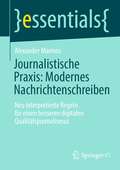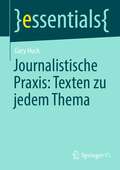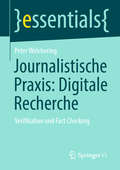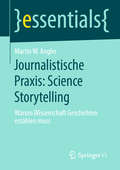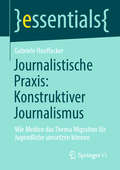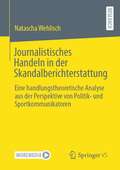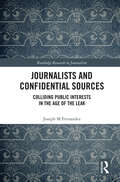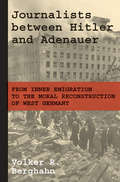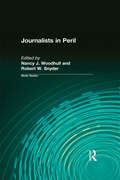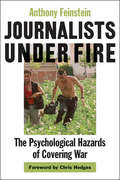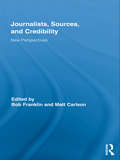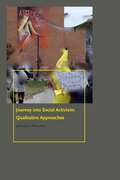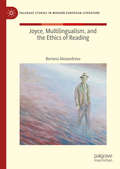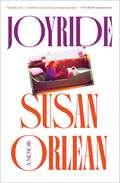- Table View
- List View
Journalistic Metamorphosis: Media Transformation in the Digital Age (Studies in Big Data #70)
by Xosé López-García Jorge Vázquez-Herrero Sabela Direito-Rebollal Alba Silva-RodríguezThis book aims to reflect how journalism has changed in recent years through different perspectives concerning the impact of technology, the reconfiguration of the media ecosystem, the transformation of business models, production and profession, as well as the influence of digital storytelling, mobile devices and participation within the context of glocal information.Journalism innovation implies modifications in techniques, technologies, processes, languages, formats and devices intended to enhance the production and consumption of the journalistic information.This book becomes an interesting resource for researchers and professionals working in news media to identify the best practices and discover new types of information flows in a rapidly changing news media landscape.
Journalistic Practice: How Media can Implement the Topic of Migration for Young People (essentials)
by Gabriele HooffackerAdolescents want media that report in an understandable way and show backgrounds and possible solutions. This book shows how the concept of constructive journalism helps with this and how it can be used in journalism training. This springer essential is a translation of the original German 1st edition essentials, Journalistische Praxis: Konstruktiver Journalismus by Gabriele Hooffacker, published by Springer Fachmedien Wiesbaden GmbH, part of Springer Nature in 2020. The translation was done with the help of artificial intelligence (machine translation by the service DeepL.com). A subsequent human revision was done primarily in terms of content, so that the book will read stylistically differently from a conventional translation. Springer Nature works continuously to further the development of tools for the production of books and on the related technologies to support the authors.
Journalistic Practice: Why science must tell stories (essentials)
by Martin W. AnglerScience needs to tell good stories to combat fake news and to communicate complex issues. To do this, there are proven techniques, structures, recurring patterns, and elements that no good story should be without. This essential shows why we are wired to respond to stories, how they affect our brains, and what techniques we can use to convey them to every kind of audience, from funders to toddlers.
Journalistic Practices in Restrictive Contexts: A Sociological Approach to the Case of Iran (Routledge Research in Journalism)
by Banafsheh RanjiBased on fieldwork conducted in Iran, this book discusses how it is possible for journalism to exist and function in a restrictive context. The book brings together a range of structural (macro), organizational (meso), and individual (micro) processes to analyze journalistic practice in a politically restrictive setting, a context thus far dominated by structural explanations. Using Pierre Bourdieu’s work as a starting point, Banafsheh Ranji develops an explanatory framework for how Iranian journalists navigate the daily 'minefield' of their professional environment. The analysis sheds light on the everyday reality of journalism in Iran, addressing factors that hinder journalists’ work while also showing how journalists use a set of double game strategies to simultaneously circumvent constraints and avoid retaliation. Moving beyond notions of censorship and repression that accompany discussions of journalism in such settings, the book instead focuses on how we may think of critical journalism, professionalism, and journalistic power, agency, and autonomy in restrictive contexts. Offering powerful insights into the realities of journalism in a tightly controlled environment, this book will be a key resource for scholars and students of journalism, media and communication studies, political science, sociology, Iranian studies, and Middle East studies.
Journalistic Role Performance: Concepts, Contexts, and Methods (Routledge Research in Journalism)
by Lea Hellmueller Claudia Mellado Wolfgang DonsbachThis volume lays out the theoretical and methodological framework to introduce the concept of journalistic role performance, defined as the outcome of concrete newsroom decisions and the style of news reporting when considering different constraints that influence the news product. By connecting role conception to role performance, this book addresses how journalistic ideals manifest in practice. The authors of this book analyze the disconnection between journalists’ understanding of their role and their actual professional performance in a period of high uncertainty and excitement about the future of journalism due the changes the Internet and new technologies have brought to the profession.
Journalistic Writing: Building the Skills, Honing the Craft
by Robert KnightAimed at those pursuing careers in creating public prose, this is the definitive handbook for aspiring journalists. Offering budding writers suggestions on how to improve their skills--even when faced with a tight deadline--this guide also reviews many elements essential to the occupation such as utilizing strong nouns and verbs, paring down adjectives and adverbs, describing with concrete detail, and avoiding clichés and the passive voice. Going beyond a standard presentation of information, this reference encourages students to put its methods into practice, making each and every word count and maintaining the appropriate energy level in their content. With expert analyses of real-world articles, this book also provides advice on avoiding poor sentence structure that can kill reader interest and includes perspectives on diversity sensitivity. Accessible, humorous, and engaging, this revised edition offers a practical approach for those seeking to improve their communication skills.
Journalistische Gatekeeper in den Sozialen Medien: Eine empirische Analyse der Nachrichtenverbreitung durch Journalist*innen anhand von Ereignis- und Meldungsmerkmalen
by Lars-Ole WehdenDie Rezeption vielfältiger Nachrichten führt zu normativ wünschenswerten Effekten. Zuletzt haben sich die Sozialen Medien für manche als wichtigste Nachrichtenquelle etabliert. Kann das dort präsentierte Nachrichtenangebot Ansprüche an Vielfalt genauso einlösen, wie andere Zugangswege? Und welche Kriterien beeinflussen die Nachrichtenselektion von Gatekeepern in den Sozialen Medien? Bisher wurden diese Fragen nur unzureichend untersucht. Ziel dieser Arbeit ist daher die Identifikation von Artikel- und Meldungsmerkmalen, die die journalistische Verbreitung von Nachrichten in den Sozialen Medien befördern. Die Vielfalt des Nachrichtenangebots in den Sozialen Medien wird zudem ihrem Äquivalent auf journalistischen Webseiten gegenübergestellt. Dazu wird eine qualitative Expertenbefragung mit einem inhaltsanalytischen Input-Output-Vergleich journalistischer Artikel verknüpft. Die Ergebnisse attestieren dem in den Sozialen Medien journalistisch präsentierten Nachrichtenangebot eine nur geringfügig verminderte Vielfalt. Nachrichtenfaktoren üben an diesem Schleusentor hingegen nur einen geringen zusätzlichen Einfluss aus. Stattdessen sind auch bisher vernachlässigte formale Aspekte bedeutsam.
Journalistische Praxis: Automatisierte Kommunikation im Journalismus und in der Public Relation (essentials)
by Markus Kaiser Aline-Florence Buttkereit Johanna HagenauerChatbots werden im Journalismus und in der Unternehmenskommunikation immer häufiger eingesetzt, um mit den Lesern bzw. Kunden auf der Website, in Apps oder in Social-Media-Kanälen zu kommunizieren. In diesem essential wird aufgezeigt, wann sich der Einsatz von Chatbots in der digitalen Kommunikation eignet und wie Chatbots konzipiert und entwickelt werden. Und worauf zu achten ist, dass die Leser bzw. Kunden Chatbots statt menschlicher Mitarbeiter akzeptieren und sich nicht frustriert abwenden. Außerdem wird ein Ausblick gegeben, wie sich Chatbots durch Machine Learning bzw. Künstliche Intelligenz weiterentwickeln könnten.
Journalistische Praxis: Ein Handbuch Für Ausbildung Und Praxis (essentials)
by Lutz FrühbrodtErzählen, erklären, einordnen: Lutz Frühbrodt zeigt, wie moderner Wirtschaftsjournalismus funktioniert. Der Band startet mit den jüngeren Umwälzungen innerhalb des Ressorts, dekliniert die typischen Anlässe und Textformate durch und endet mit einem Plädoyer für eine „Nachhaltigkeits-Perspektive“ in der Unternehmensberichterstattung.
Journalistische Praxis: Eine praktische Anleitung (essentials)
by Martin W. AnglerKein Medium kann Wissenschaft so schnell der Öffentlichkeit vermitteln wie das Web. Blogs spielen dabei eine maßgebliche Rolle, weil sie in puncto Substanz genau zwischen hochkomplexen Papers und sehr vereinfachten Social Media-Beiträgen liegen. Dieses Buch zeigt, wieso Wissenschaftler diese Art des Publizierens in ihre Forschungsarbeit integrieren sollten. Es gibt praktische Ratschläge darüber, wie Blogs geplant werden müssen, wie sich Blogposts strukturieren lassen, welche geschriebenen Formate am effektivsten zur Wissenschaftskommunikation funktionieren und wie die Beiträge so geplant und publiziert werden können, dass sie ihr Publikum erreichen.
Journalistische Praxis: Innovationen planen und umsetzen (essentials)
by Björn Staschen Katja Schupp Judith HagerDer Band beleuchtet, wie Journalist*innen im digitalen, non-linearen Zeitalter ihren demokratischen Auftrag erfüllen können – kreativ, innovativ und zukunftsfähig. Dieses Essential möchte dazu inspirieren journalistische Produkte, Prozesse und Dienstleistungen so zu verändern, dass sie aktuellen Bedürfnissen entsprechen und echten Mehrwert schaffen. Mit innovativen Beispielen und praktischen Methoden bietet es Impulse, die Herausforderungen der Medienlandschaft als Chance zu nutzen. Für alle, die überzeugt sind, dass guter Journalismus der Schlüssel zu einer robusten Demokratie ist.
Journalistische Praxis: Neu interpretierte Regeln für einen besseren digitalen Qualitätsjournalismus (essentials)
by Alexander MarinosDer Online-Journalismus hat dem Nachrichtenschreiben neues Leben eingehaucht. Mobile User verlangen nach schneller und präziser Information, die Platz auf einem kleinen Bildschirm findet. Erfolgreiche Content-Produzenten erinnern sich darum an die „umgekehrte Pyramide“, an Nachrichtenfaktoren und W-Fragen. Sie wissen, wann man Präsens, Perfekt und Imperfekt einsetzt und wie das mit den Konjunktiven funktioniert. Und natürlich haben Sie eine Ahnung davon, wie ein Online-Teaser verfasst werden muss, um Reichweite zu erzeugen.Modernes Nachrichtenschreiben bedeutet aber nicht nur, die um digitale Aspekte erweiterten klassischen Regeln beherrschen und anwenden zu können. Es geht darum, diese Regeln weiterzuentwickeln – und auch einmal lustvoll über den Haufen zu werfen. Mut zu mehr Lebendigkeit und zum professionellen Anderssein wird zum Qualitätsmerkmal. So machen Nachrichten wieder Spaß: beim Schreiben und beim Lesen.
Journalistische Praxis: Texten zu jedem Thema (essentials)
by Gary HuckDieses Buch ist ein auf das Wesentliche reduziertes Einstiegswerk für professionelles Schreiben. Sie erhalten Grundwissen darüber, wie Sie ein Thema für Ihren Text finden, wie Sie dieses Thema in einer Recherche vertiefen und anschließend die Recherche als Text umsetzen. Neben theoretischem Wissen enthält dieses Buch auch Beispiele aus der Praxis, die die theoretischen Inhalte veranschaulichen. Dieses Buch soll vor allem Einsteigern im Bereich Texten helfen, schnell grundlegende Fähigkeiten aufzubauen, um aussagekräftige Texte zu verfassen. Es war die Intention des Buches, einen Leitfaden für Volontäre und Trainees aus den Bereichen Medien und Kommunikation zu schaffen, durch den man innerhalb eines Nachmittags die Grundlagen des Textens lernen kann. Auch soll dieses Buch seine Leser dazu anregen, ihr Wissen konsequent praktisch anzuwenden und sich weiter mit der Materie Texten auseinanderzusetzen.
Journalistische Praxis: Verifikation und Fact Checking (essentials)
by Peter WelcheringFür die Recherche im Netz und für die Faktenprüfung stehen jedem Journalisten professionelle Werkzeuge zur Verfügung. Oft sind die als Open-Source-Software oder als kostenlose Web-Angebote nutzbar. Auch das erforderliche Know-How, um mit diesen Werkzeugen arbeiten zu können, ist leicht erlernbar. Wie Journalisten sich digitale Quellen erschließen, sie verifizieren oder falsifizieren, wie sie gezielt auf Social-Media-Plattformen, im sogenannten „Darknet“ oder „Deep Web“ sowie mit (Spezial-) Suchmaschinen recherchieren; Videos, Fotos und andere Dateien analysieren, das wird in diesem Buch gezeigt.
Journalistische Praxis: Warum Wissenschaft Geschichten erzählen muss (essentials)
by Martin W. AnglerWissenschaft muss gute Geschichten erzählen, um Fake News zu bekämpfen und um komplexe Themen zu vermitteln. Dazu gibt es erprobte Techniken, Strukturen, wiederkehrende Muster und Elemente, die in keiner guten Geschichte fehlen dürfen. Dieses essential zeigt, wieso wir so verdrahtet sind, auf Geschichten zu reagieren, wie sie auf unser Gehirn wirken und welche Techniken wir einsetzen können, um sie an jede Art von Publikum zu vermitteln, vom Geldgeber bis zum Kleinkind.
Journalistische Praxis: Wie Medien das Thema Migration für Jugendliche umsetzen können (essentials)
by Gabriele HooffackerHeranwachsende wünschen sich Medien, die verständlich berichten, Hintergründe und Lösungsmöglichkeiten aufzeigen. Wie das Konzept des konstruktiven Journalismus dabei hilft und wie es in der Journalismusausbildung eingesetzt werden kann, zeigt dieses Buch.
Journalistisches Handeln in der Skandalberichterstattung: Eine handlungstheoretische Analyse aus der Perspektive von Politik- und Sportkommunikatoren
by Natascha WehlischSkandale sind zweifellos ein wichtiges Korrektiv innerhalb demokratischer Gesellschaften. Gleichzeitig kritisieren Sozialwissenschaftler den verstärkten Einsatz von Skandalisierungen als Mittel im massenmedialen Aufmerksamkeitswettbewerb sowie beobachtbare Personalisierungs- und Boulevardisierungstendenzen der Berichterstattung, die langfristig zu dysfunktionalen Effekten in der Bevölkerung wie einem Überdruss an Skandalen, Abstumpfungseffekten und gesellschaftlicher Instabilität führen können. Die Autorin zeigt aufbauend auf einem strukturell-individualistischen Modell sowie leitfadengestützten Experteninterviews mit Journalisten verschiedener Mediengattungen und Ressorts, wie unterschiedliche interne und externe Bedingungen die Handlungsentscheidung von Journalisten in Skandalsituationen beeinflussen und wie Einzelhandlungen verschiedener Akteure in ihrer Aggregation zu unerwünschten gesellschaftlichen Folgeeffekten führen können. Die Ergebnisse der Arbeit sollen zu einer Versachlichung der Diskussion beitragen und negativen Folgeeffekten zunehmender medialer Skandalisierung durch eine Sensibilisierung der Akteure entgegenwirken.
Journalists and Confidential Sources: Colliding Public Interests in the Age of the Leak (Routledge Research in Journalism)
by Joseph M FernandezJournalists and Confidential Sources explores the fraught and widespread reliance by journalists on anonymous sources, whistleblowers and others to whom they owe an obligation of confidentiality. It examines the difficulties afflicting such relationships; the deteriorating ‘right to know’ and freedom of expression frameworks; and explores solutions and reforms. The book discusses key Australian and international source protection ethics rules, statutes, court cases, law enforcement actions and case studies. It highlights weakness in journalists’ professional practice codes governing confidentiality obligations; discusses inadequate journalistic appreciation of the importance of establishing clear terms and conditions underpinning confidentiality obligations; and identifies shortcomings in the law governing source protection. The book argues that despite source protection being widely recognised as an important ideal, source protection is under sustained assault, thereby undermining public access to information, and democracy itself. The work focusses on Australia, but takes into account source protection in the United Kingdom, the United States, Canada and New Zealand. This timely contribution to the global discussion on the subject will greatly interest journalists, scholars, educators, and students especially in the areas of media law and policy, journalism, media and communication studies, and public relations; the legal fraternity; and anyone who communicates with journalists.
Journalists between Hitler and Adenauer: From Inner Emigration to the Moral Reconstruction of West Germany
by Volker R. BerghahnThe moral and political role of German journalists before, during, and after the Nazi dictatorshipJournalists between Hitler and Adenauer takes an in-depth look at German journalism from the late Weimar period through the postwar decades. Illuminating the roles played by journalists in the media metropolis of Hamburg, Volker Berghahn focuses on the lives and work of three remarkable individuals: Marion Countess Dönhoff, distinguished editor of Die Zeit; Paul Sethe, “the grand old man of West German journalism”; and Hans Zehrer, editor in chief of Die Welt.All born before 1914, Dönhoff, Sethe, and Zehrer witnessed the Weimar Republic’s end and opposed Hitler. When the latter seized power in 1933, they were, like their fellow Germans, confronted with the difficult choice of entering exile, becoming part of the active resistance, or joining the Nazi Party. Instead, they followed a fourth path—“inner emigration”—psychologically distancing themselves from the regime, their writing falling into a gray zone between grudging collaboration and active resistance. During the war, Dönhoff and Sethe had links to the 1944 conspiracy to kill Hitler, while Zehrer remained out of sight on a North Sea island. In the decades after 1945, all three became major figures in the West German media. Berghahn considers how these journalists and those who chose inner emigration interpreted Germany’s horrific past and how they helped to morally and politically shape the reconstruction of the country.With fresh archival materials, Journalists between Hitler and Adenauer sheds essential light on the influential position of the German media in the mid-twentieth century and raises questions about modern journalism that remain topical today.
Journalists in Peril
by Robert W. Snyder Nancy J. WoodhullThreats to journalists carry many different lessons, but one is constant: People who would intimidate or kill journalists are usually terrified that someone might find out. Journalists who want to protect one another need do nothing more than what should come naturally to them: report on threats to journalists--big threats and small threats, whether they are directed against the international luminaries of the profession or small timers. Non-journalists can also play a big part in the fight to protect journalists. Next to tough and timely reporting that establishes the facts of a case, nothing protects a journalist so much as public outrage and public support. Ordinary citizens can play an enormous role by pressuring thugs and tyrants who would like to stifle the freedom of the press. The freedom of journalists is consequently the bedrock of freedom for all people. Chapters and contributors to 'Journalists in Peril' include: "The Clash of Arms in Exotic Locales" by Peter Arnett; "Press Freedom--Balkan Style" by Kati Marton; "Grim Prospects for Hong Kong" by John Schidlovsky; "Russian Reporters--Between a Hammer and an Anvil" by losif M. Dzyaloshinsky; "Defiant Publishing in Nigeria" by Dapo Olorunyomi; "Turkish Journalists on Trial" by Ahmet Emin; "In America, Justice for Some" by Ana Arana; and "Blood and Fear in Italy" by Candida Curzi. The tragic accounts detailed in 'Journalists in Peril' are poignantly written and are important reading for all concerned with democracy in the world, especially political scientists, government officials, and those involved in the various communications professions.
Journalists under Fire: The Psychological Hazards of Covering War
by Anthony FeinsteinOutstanding Academic Title for 2007, Choice MagazineAs journalists in Iraq and other hot spots around the world continue to face harrowing dangers and personal threats, neuropsychiatrist Anthony Feinstein offers a timely and important exploration into the psychological damage of those who, armed only with pen, tape recorder, or camera, bear witness to horror. Based on a series of recent studies investigating the emotional impact of war on the profession, Journalists under Fire breaks new ground in the study of trauma-related disorders. Feinstein opens with an overview of the life-threatening hazards war reporters face—abductions, mock executions, the deaths of close colleagues—and discusses their psychological consequences: post-traumatic stress disorder, depression, deterioration of personal relationships, and substance abuse. In recounting the experiences of reporters who encounter trauma on the job, Feinstein observes that few adequate support systems are in place for them. He tells the stories of media veterans who have "seen it all," only to find themselves and their employers blindsided by psychological aftershocks. The book explores the biological and psychological factors that motivate journalists to take extraordinary risks. Feinstein looks into the psyches of freelancers who wade into war zones with little or no financial backing; he examines the different stresses encountered by women working in a historically male-dominated profession; and he probes the effects of the September 11 attacks on reporters who thought they had sworn off conflict reporting. His interviews with many of this generation's greatest reporters, photographers, and videographers often reveal extraordinary resilience in the face of adversity. Journalists under Fire is a look behind the public persona of war journalists at a time when the profession faces unprecedented risk. Plucking common threads from disparate stories, Feinstein weaves a narrative that is as fascinating to read as it is sobering to contemplate. What emerges are unique insights into lives lived dangerously.
Journalists, Sources, and Credibility: New Perspectives (Routledge Research in Journalism)
by Bob FranklinThis volume revisits what we know about the relationship between journalists and their sources. By asking new questions, employing novel methodologies, and confronting sweeping changes to journalism and media, the contributors reinvigorate the conversation about who gets to speak through the news. It challenges established thinking about how journalists use sources, how sources influence journalists, and how these patterns relate to the power to represent the world to news audiences. Useful to both newcomers and scholars familiar with the topic, the chapters bring together leading journalism scholars from across the globe. Through a variety of methods, including surveys, interviews, content analysis, case studies and newsroom observations, the chapters shed light on attitudes and practices in the United States, United Kingdom, Germany, Australia, Sweden, Belgium and Israel. Special attention is paid to the changing context of newswork. Shrinking newsgathering resources coupled with a growth in public relations activities have altered the source-journalist dynamic in recent years. At the same time, the rise of networked digital technologies has altered the barriers between journalists and news consumers, leading to unique forms of news with different approaches to sourcing. As the media world continues to change, this volume offers a timely reevaluation of news sources.
Journey into Social Activism: Qualitative Approaches (Donald McGannon Communication Research Center's Everett C. Parker Book Series)
by Joshua D. AtkinsonAcademic study of social activism and social movements has become increasingly prevalent over the years; this is due in large part to the fact that activists have captured public imagination and gained substantial influence in political discourse. For instance, Occupy Wall Street activists, Tea Party activists, and activists affiliated with the Arab Spring have transformed political debates and have become the focus of mainstream news media coverage about a variety of different political topics.Journey into Social Activism explicates the philosophical foundations of the study of activism and illustrates four different research sites in which activism can be observed and studied: organizations, networks, events, and alternative media. The book will introduce students and scholars to important qualitative approaches to the study of social activism within these four research sites, which is based entirely on successful research projects that have been conducted and published in recent years. Ultimately, this book will prove integral to any students and scholars who wish to use qualitative methods for their research endeavors concerning socialactivism in contemporary society.
Joyce, Multilingualism, and the Ethics of Reading: Deplurabel Muttertongues (Palgrave Studies in Modern European Literature)
by Boriana AlexandrovaWhat if our notions of the nation as a site of belonging, the home as a safe place, or the mother tongue as a means to fluent comprehension did not apply? What if fluency were a hindrance, whilst our differences and contradictions held the keys to radical new ways of knowing? Taking inspiration from the practice of language learning and translation, this book explores the extraordinary creative possibilities, politics, and ethics of adopting a multilingual approach to reading. Its case study, James Joyce’s Finnegans Wake (1939), is a text in equal measures exhilarating and exasperating: an unhinged portrait of European modernist debates on transculturalism and globalisation, here considered on the backdrop of current discourses on migration, race, gender, and neurodiversity. This book offers a fresh perspective on the illuminating, if perplexing, work of a beloved European modernist, whilst posing questions far beyond Joyce: on negotiating difference in an increasingly globalised world; on braving the difficulty of relating across languages and cultures; and ultimately on imagining possible futures where multilingual literature can empower us to read, relate, and conceptualise differently.
Joyride: A Memoir
by Susan OrleanFrom the beloved New Yorker writer Susan Orlean, New York Times bestselling author of The Orchid Thief and The Library Book and hailed as &“a national treasure&” by The Washington Post, Joyride is a masterful memoir of finding her creative calling and purpose that invites us to approach life with wonder, curiosity, and an irrepressible sense of delight.&“The story of my life is the story of my stories,&” writes Susan Orlean in this extraordinary, era-defining memoir from one of the greatest practitioners of narrative nonfiction of our time. Joyride is a magic carpet ride through Orlean&’s life and career, where every day is an opportunity for discovery and every moment holds the potential for wonder. Throughout her storied career, her curiosity draws her to explore the most ordinary and extraordinary of places, from going deep inside the head of a regular ten-year-old boy for a legendary profile (&“The American Man Age Ten&”) to reporting on a woman who owns twenty-seven tigers, from capturing the routine magic of Saturday night to climbing Mt. Fuji. Not only does Orlean&’s account of a writing life offer a trove of indispensable gleanings for writers, it&’s also an essential and practical guide to embracing any creative path. She takes us through her process of dreaming up ideas, managing deadlines, connecting with sources, chasing every possible lead, confronting writer&’s block and self-doubt, and crafting the perfect lede—a Susan specialty. While Orlean has always written her way into other people&’s lives in order to understand the human experience, Joyride is her most personal book ever—a searching journey through finding her feet as a journalist, recovering from the excruciating collapse of her first marriage, falling head-over-heels in love again, becoming a mother while mourning the decline of her own mother, sojourning to Hollywood for films based on her work including Adaptation and Blue Crush, and confronting mortality. Joyride is also a time machine to a bygone era of journalism, from Orlean&’s bright start in the golden age of alt-weeklies to her career-making days working alongside icons such as Robert Gottlieb, Tina Brown, David Remnick, Anna Wintour, Sonny Mehta, and Jonathan Karp—forces who shaped the media industry as we know it today. Infused with Orlean&’s signature warmth and wit, Joyride is a must-read for anyone who hungers to start, build, and sustain a creative life. Orlean inspires us to seek out daily inspiration and rediscover the marvels that surround us.
